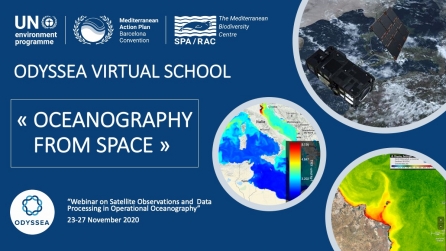Search
11/20: Virtual school “satellite observations & data processing in operational oceanography”
The virtual school of “Oceanography from Space” started on November 23rd 2020 at 10:00am (CET), with an attendance of over 100 participants from 26 countries of five continents.
As a recall, the webinar is organized by UNEP/MAP-SPA/RAC within the framework of the European Union funded project ODYSSEA (grant agreement n°727277) and will continue until 27 November. This online school replaces the third ODYSSEA summer school that was cancelled due to the COVID-19 pandemic.
Opening the virtual school, Mr Khalil ATTIA, SPA/RAC Director, emphasized the experience of the centre in the organization of capacity building activities through training sessions, courses and on the job training for the benefit of Mediterranean countries, signatories of the Barcelona Convention. Mr ATTIA underlined that the main goal of the ODYSSEA School is to give technical skills to the participants in handling satellite and in-situ data in synergy and to develop marine research approach based on multi-sources information, allowing the trainees to become ready to face the challenges of the next decade 2021-2030, which has been declared by UN as the decade of Oceans.
Then Professor Georgios SYLAIOS, from the Democritus University of Thrace (Greece) and coordinator of the ODYSSEA project, opened the first training session to introduce the webinar. He has underlined the importance of satellite data and the Copernicus programme for the ODYSSEA project.

The second lecturer, Dr Hayley Evers-King from EUMETSAT, marine specialist at the European Organization for the Exploitation of Meteorological Satellites, gave an overview on the satellite functionalities for Ocean monitoring at different spatial and temporal scales. Dr Evers-King presented the panoply of Earth Observing Satellite of the European Spatial Agency currently in orbit (SENTINEL) and how to access to the data through different platforms.
During the afternoon session, Professor SYLAIOS presented the outcomes obtained by the partners involved in ODYSSEA project, notably the Marinomica data platform (marinomica.com) and its data analysis functionalities, the development of a micro-plastic sensor designed to be deployed on gliders, the in-situ data acquired using gliders, landers and surface buoys, the modelling results in different areas of the Mediterranean Sea, the capacity building activities and stakeholders involvement in decision-making.
The SPA/RAC would like to thank all its project partners for the success of the training, in particular Democritus University of Thrace, Collecte Localisation Satellites SA (CLS), Foundation for Research and Technology Hellas (Forth), Deltares and Blue Lobster IT Limited, as well as all the trainers and organisations who collaborated in this initiative.
To see the training programme and speakers, click here.
Know more about the ODYSSEA project: odysseaplatform.eu




Find Us On...